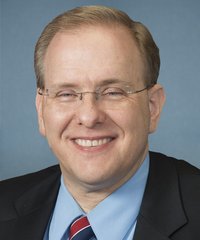
Congressman Jim Langevin (LAN'-jih-vin) is a senior member of the House Armed Services Committee, on which he chairs the Cyber, Innovative Technologies, and Information Systems Subcommittee and serves on the Subcommittees on Seapower and Projection Forces and Strategic Forces. He is a senior member of the Committee on Homeland Security and serves on its Subcommittees on Intelligence & Counterterrorism and Cybersecurity, Infrastructure Protection, & Innovation.
Langevin was one of four legislators appointed to serve on the Cyberspace Solarium Commission
, and he co-founded the Congressional Cybersecurity Caucus, which he still co-chairs, to increase awareness around the need for stronger cybersecurity. A national leader on securing our nation’s technology infrastructure against cyber threats, Langevin has authored or co-authored dozens of pieces of cybersecurity legislation, including most recently the National Cyber Director Act.
Our most vulnerable citizens are disproportionately affected by job cuts, higher food prices, turmoil in the housing market and other economic challenges that can have a devastating impact. The U.S. Census Bureau reported that our country’s poverty rate in 2019 was 10.5 percent. That same year, our child poverty rate was 14.4 percent. We must raise the living standards of America’s working families so that all children have the same opportunities to thrive.
As the co-chair of the Congressional Caucus on Foster Youth and someone who had foster siblings growing up, protecting the more than 400,000 children in foster care in the United States is an issue close to my heart. We have an obligation to provide for them the way we would our own children, ensuring they have all the same opportunities and support.
A 2013 Reuters investigation exposed an alarming trend of adopted children being “re-homed” into the custody of strangers without any oversight, putting the children at risk for neglect and abuse. To combat re-homing, I have introduced several pieces of legislation to ban unregulated custody transfers and to address the root causes: a lack of preparation and support for adoptive parents navigating the challenges that may arise after bringing their child home. I support increased pre-adoption training and post-adoption support services, including mental health treatment for children who may have faced trauma, loss, and abuse prior to their adoptions. I am committed to fighting for the resources necessary to place every child in a safe and loving home.
More than 20,000 young people age out of the foster care system every year. They often end up with no support network to lean on as they navigate the transition to adulthood. To assist these young adults, I have been a longtime supporter of the John H. Chafee Foster Care Program for Successful Transition to Adulthood, a program that provides career counseling, mental health services, and life transition counseling to young adults who are aging out of the foster care system. The Chafee program can also provide up to $5,000 for foster youth to attend college.
While these services are always important, they have become all the more critical during the COVID-19 pandemic. Navigating the transition to adulthood during a global pandemic is difficult for anyone, even with a strong support network of friends and family. Youth aging out of foster care should not have to face these uncertain times alone. That is why I introduced legislation to more than double Chafee funding for the duration of the pandemic – because we are all in this together.
The cost of childcare in the United States is alarmingly high. No parent should have to worry about choosing between keeping their children safe and putting food on the table. I strongly support the Child Care and Development Fund, a program that helps low-income families cover the cost of childcare. I also believe that no parent should have to risk losing their job in order to care for a sick child, which is why I support giving workers the opportunity to earn paid sick days to care for themselves and their families.
Early childhood is one of the most formative stages of life, and education is especially important. It is during this period that many children living in poverty fall behind their peers, leaving them at a disadvantage before they’ve even started kindergarten. I have advocated for investments in programs like Head Start, which connect low-income children and families to resources that even the playing field, helping them to develop the social and academic skills they’ll need to succeed in kindergarten.
More than 5 million children live in food-insecure households in the United States. No child should ever have to wonder where their next meal will come from, and I strongly support expanding eligibility for free and reduced-cost meals in our school systems.
I have also long supported increased funding for the Supplemental Nutrition Assistance Program (SNAP). SNAP helps families put food on the table while providing quick and effective stimulus for our economy. You can learn more about applying for SNAP benefits in Rhode Island from the Department of Human Services. I am also proud to support the Special Supplemental Nutrition Program for Women, Infants, and Children (WIC), which provides nutritious food, counseling on healthy eating, and health care referrals for low-income women and young children. In Rhode Island, WIC collaborates with local farmers markets to provide cooking demonstrations, information on healthy eating habits, and activities for children. The Department of Health has more information about applying for WIC benefits in Rhode Island.